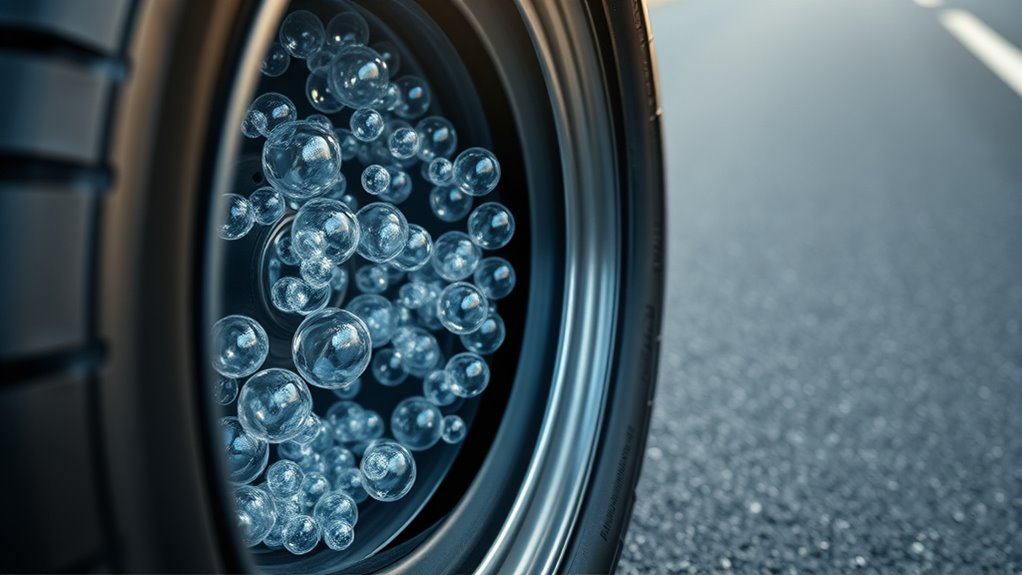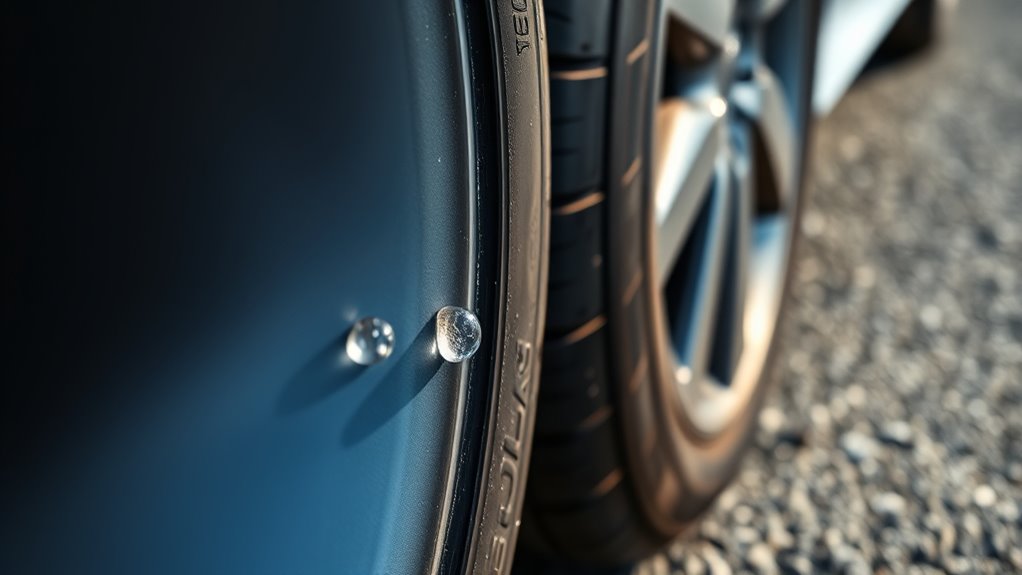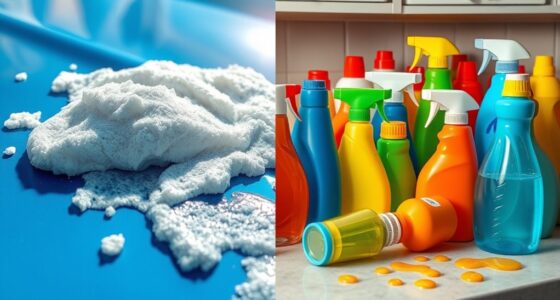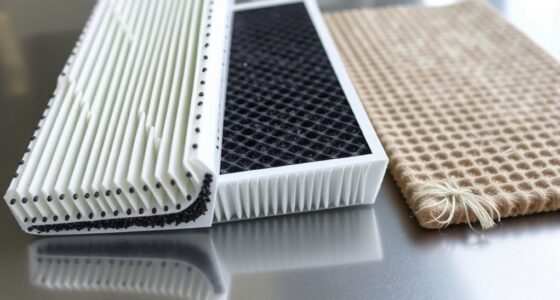Using nitrogen in your tires helps maintain consistent pressure longer than regular air, which contains moisture and mixed gases that can escape more easily. This stability can lead to better fuel efficiency, improved handling, and less frequent top-offs. While nitrogen usually costs more upfront, the benefits of decreased pressure loss and tire wear could save you money over time. Keep going to discover how these differences can impact your driving experience and vehicle safety.
Key Takeaways
- Nitrogen maintains tire pressure longer due to its inert, moisture-free nature, reducing pressure loss over time.
- Using nitrogen minimizes moisture inside tires, decreasing corrosion and extending tire lifespan.
- Although initially more expensive, nitrogen can improve fuel efficiency and reduce maintenance costs over time.
- Regular air is cost-effective and suitable for drivers who frequently check and top off tire pressure.
- Overall, nitrogen offers enhanced pressure stability and safety, especially for long-distance or high-performance driving.

When it comes to maintaining your vehicle’s tires, you might wonder whether nitrogen or regular air is the better choice. Both options serve to keep your tires inflated, but they differ in ways that can impact your driving experience and maintenance routine. One of the main advantages of nitrogen is its ability to maintain tire pressure stability much longer than regular air. Unlike regular air, which contains moisture and a mix of gases, nitrogen is a dry, inert gas that doesn’t easily escape through the rubber. This means your tires stay at the ideal pressure for a longer period, reducing the need for frequent top-offs. Proper tire pressure is essential because it affects handling, fuel efficiency, and tire wear. When your tires stay properly inflated, you get a smoother ride and better mileage, saving you money in the long run.
However, it’s important to think about the cost comparison between nitrogen and regular air. Filling tires with nitrogen typically comes with a higher upfront expense, especially if you have to visit a specialized service provider. Many gas stations offer free or inexpensive refills with regular air, making it a more budget-friendly option for most drivers. While nitrogen might save you some time and effort by maintaining pressure longer, the initial cost can be a deterrent if you’re on a tight budget. Over time, you might find that the savings in fuel and tire longevity could offset the higher initial expense, but it depends on your driving habits and how often you need to refill your tires.
Ultimately, the choice between nitrogen and regular air hinges on your priorities. If you prefer fewer trips to the pump and better tire pressure stability, investing in nitrogen could be worthwhile. It’s especially beneficial if you drive frequently or over long distances, where maintaining ideal pressure is more critical. On the other hand, if you’re looking to keep costs low and don’t mind checking your tire pressure regularly, regular air is a perfectly acceptable, cost-effective choice. Both options will help you keep your tires in good shape, but nitrogen’s key benefit lies in its ability to keep your tires properly inflated for longer periods, ensuring safer driving and improved efficiency.
Frequently Asked Questions
How Does Nitrogen Affect Tire Pressure Over Time?
Using nitrogen helps maintain your tire pressure longer because it’s less prone to leakage compared to air. This pressure stability means your tires stay properly inflated, which can improve tire longevity and fuel efficiency. Over time, nitrogen’s inert properties prevent pressure fluctuations caused by temperature changes. So, with nitrogen, you spend less time adjusting tire pressure and enjoy consistent performance, ultimately extending the life of your tires.
Is Nitrogen Better for High-Performance or Racing Tires?
Yes, nitrogen is better for high-performance or racing tires because it helps maintain consistent tire pressure, which boosts tire longevity and fuel efficiency. You’ll notice less pressure loss over time, ensuring ideal grip and handling during races. This stability reduces uneven tire wear, saves you money on replacements, and enhances your vehicle’s overall performance, making nitrogen an preferable choice for demanding driving conditions where precision matters most.
Can I Switch Back From Nitrogen to Regular Air Easily?
Imagine you switch from nitrogen to regular air for your tires. You can do it easily; just let out the nitrogen and top up with air. Keep in mind, tire sealing might be affected temporarily, and you’ll need to check pressures more often. The cost comparison shows switching back is inexpensive, but remember, you may lose some long-term benefits like more stable pressure. It’s a simple process overall.
Does Nitrogen Prevent Tire Blowouts More Effectively?
Nitrogen doesn’t necessarily prevent tire blowouts more effectively than air, but it can help improve tire longevity by maintaining more stable pressure and reducing moisture inside the tire. This stability can decrease the risk of blowouts caused by pressure fluctuations. However, nitrogen tends to be more costly, so consider the cost implications. If you prioritize consistent pressure and potentially longer tire life, nitrogen might be worth it, but it’s not a guaranteed safety fix.
Are There Environmental Benefits to Using Nitrogen in Tires?
Using nitrogen in your tires offers eco-friendliness benefits by reducing the carbon footprint. Since nitrogen escapes more slowly than air, your tires stay properly inflated longer, decreasing fuel consumption and emissions. This helps lower your vehicle’s environmental impact, conserving energy and reducing pollution. By choosing nitrogen, you contribute to a more sustainable environment, supporting efforts to minimize pollution and promote cleaner air for everyone.
Conclusion
Choosing nitrogen over air in your tires can remarkably improve your driving experience. Did you know that nitrogen retains pressure 20% longer than air, reducing your need for frequent top-offs? This means fewer trips to the gas station, better fuel efficiency, and safer, more reliable tires. By making the switch, you’re not just enhancing your vehicle’s performance—you’re also saving time and money in the long run. It’s a simple change with impressive benefits.









